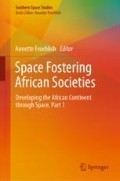Abstract
Most African countries are beginning to embrace the role space science and technology play in our everyday lives considering the potential it has in proffering solutions to some of the challenges being faced on the continent and the ability it has to foster development, growth and innovation in so many ways. However, space access and assets for African countries with satellites in space were attained mostly with the help of other countries outside the African continent while incorporating little indigenous input in the process. This article examines the role indigenous space capabilities can play in promoting development in Africa at a period the global community is heading towards Industrial Revolution 4.0 and Space 4.0. It also explores the experience of advanced space faring nations and the contributions space science and technology programmes have made on their development. Lessons learned could be adapted for development of local and regional space capabilities within the African continent to aid advancement of space technology and contribute to economic growth of the continent in general. Also discussed are the role of capacity building and partnerships through relevant institutions that could facilitate this process.
Access this chapter
Tax calculation will be finalised at checkout
Purchases are for personal use only
Notes
- 1.
Adigun Ade Abiodun, ‘Space Education’ (1997) 20 Advances in Space Research 1341.
- 2.
Franklin A Long, ‘The Industrial Impact of Apollo’ (1969) 25 Bulletin of the Atomic Scientists 70.
- 3.
Stephen E Doyle, ‘Benefits to Society from Space Exploration and Use’ (1989) 19 Acta Astronautica 749.
- 4.
Samuel Anih, ‘Passive to Active Space and the Role Space Assets in Sustainable Development’ in Annette Froehlich (ed), Embedding Space in African Society. Southern Space Studies (Springer 2019).
- 5.
United Nations Department of Economic and Social Affairs Population Division, ‘World Population Prospects: The 2017 Revision, Key Findings and Advance Tables. Working Paper No. ESA/P/WP/248.’ (2017) <https://esa.un.org/unpd/wpp/Publications/Files/WPP2017_KeyFindings.pdf>.
- 6.
Bertrand de Montluc, ‘The New International Political and Strategic Context for Space Policies’ (2009) 25 Space Policy 20.
- 7.
Klaus Schwab, ‘The Fourth Industrial Revolution: What It Means, How to Respond’ (World Economic Forum, 2016) <https://www.weforum.org/agenda/2016/01/the-fourth-industrial-revolution-what-it-means-and-how-to-respond/> accessed 12 February 2019.
- 8.
ESA Ministerial Council, ‘What Is Space 4.0’ (2016) <https://www.esa.int/About_Us/Ministerial_Council_2016/What_is_space_4.0> accessed 15 April 2019.
- 9.
Jan Wörner, ‘#SPACE4.0’ (2016) <http://www.europarl.europa.eu/cmsdata/111744/ITRE2016-ESA-point13.pdf> accessed 7 April 2019.
- 10.
Peter T Gilruth and others, ‘Measuring Performance: Moving NASA Earth Science Products into the Mainstream User Community’ (2006) 22 Space Policy 165.
- 11.
Sias Mostert and others, ‘Sumbandilasat—An Operational Technology Demonstrator.Pdf’ (2008) 63 Acta Astronautica 1273.
- 12.
Danielle Wood and Annalisa Weigel, ‘Architectures of Small Satellite Programs in Developing Countries’ (2014) 97 Acta Astronautica 109.
- 13.
Joseph Ibeh, ‘A Breakdown of the 30 Satellites Launched by African Nations’ (Space in Africa, 2019) <https://africanews.space/an-outlook-of-the-30-satellites-launched-in-africa/>.
- 14.
Doyle (n 4).
- 15.
Kingsley Chiedu Moghalu, Emerging Africa: How the Global Economy’s ‘Last Frontier’ Can Prosper and Matter (Penguin 2014).
- 16.
AJ Smit, ‘The Competitive Advantage of Nations: Is Porter’s Diamond Framework a New Theory That Explains the International Competitiveness of Countries?’ (2010) 14 Southern African Business Review 105.
- 17.
JO Aseno, ‘Space Science Education in the African Continent’ (1997) 20 Advances in Space Research 1411.
- 18.
UM Leloglu and E Kocaoglan, ‘Establishing Space Industry in Developing Countries: Opportunities and Difficulties’ (2008) 42 Advances in Space Research 1879.
Author information
Authors and Affiliations
Corresponding author
Editor information
Editors and Affiliations
Rights and permissions
Copyright information
© 2020 Springer Nature Switzerland AG
About this chapter
Cite this chapter
Anih, S. (2020). Building Indigenous Space Capabilities as a Launchpad for Technological Advancement in Africa. In: Froehlich, A. (eds) Space Fostering African Societies. Southern Space Studies. Springer, Cham. https://doi.org/10.1007/978-3-030-32930-3_8
Download citation
DOI: https://doi.org/10.1007/978-3-030-32930-3_8
Published:
Publisher Name: Springer, Cham
Print ISBN: 978-3-030-32929-7
Online ISBN: 978-3-030-32930-3
eBook Packages: Law and CriminologyLaw and Criminology (R0)

